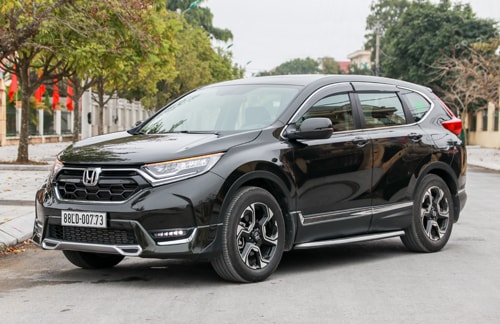Imported cars from Thailand have a good chance of returning to Vietnam.
Car manufacturers provide type approval certificates, the key to opening up opportunities for imported cars into Vietnam.
The Vietnam Automobile Manufacturers Association said that the Ministry of Transport has accepted the type approval certificate issued by the Thai government for vehicles exported from Thailand to Vietnam. This is the most important document, the key to opening the door that is almost closed to cars imported from Thailand.
Mr. Pham Anh Tuan, General Director of Toyota Vietnam's Strategic Planning Department, said that the companies have submitted this type of paper to the Ministry of Transport for a while and the Ministry recently agreed. The companies are urgently planning to bring back seamless import activities after many months of interruption.
Decree 116 was issued in October 2017, and in the last two months of last year, the companies sold the remaining cars in stock and the last batches of pre-ordered goods. In the first two months of 2018, the companies had no more cars to sell, and the number of cars floating on the market at dealers was also very rare.
|
Once the type approval certificate is resolved, imported cars like CR-V will have wide access to Vietnam. |
Honda Vietnam said the new CR-V will arrive in early March, but the time at the port could be up to two months because of the batch inspection, so the cars will only be on the market in late April or early May. According to customs regulations, the tax value in a shipment declaration cannot exceed 12 digits. Therefore, for high-value cars, thousands of imported cars can be divided into multiple batches in the same shipment, each batch must be inspected separately, and the waiting time at the port will increase. Honda currently has 5 imported car models, of which 4 are from Thailand: CR-V, Civic, Accord, and soon Jazz, only Odyssey is imported from Japan.
Meanwhile, Toyota cannot bring imported cars back as early as Honda because it has to re-order the factory from the beginning. The previously ordered shipments that cannot be returned to the country have been modified to be exported to other markets. From the time of placing the order to the time they can leave the factory and board the ship to Vietnam will take about 3 months or more. So, at least June will be the time to have imported Toyota cars from Thailand. Ford is in a similar situation to Toyota. The car company is still waiting for official responses from Ford Thailand and has not yet ordered a new batch.
Toyota's best-selling imported car, Fortuner, has no chance because it is from Indonesia. The government of this country has not yet agreed to issue a type quality certificate for cars exported to Vietnam. The luxury car brand Lexus is in a similar situation, the Japanese government does not provide the certificate, Lexus Vietnam can consider importing cars from Europe.
The disruption of imported cars is an opportunity to increase sales for assembled models. Fortuner is out of stock, customers can switch to Hyundai Santa Fe, even lower segments such as Tucson, CX-5, Outlander assembled. The advantage of having stock can also be a reason to increase prices, taking advantage of the opportunity to bring in higher profits.
According to experts, the problem with Decree 116 at this point is no longer whether the companies can provide type quality certificates or not, but rather the time. A middle manager of a European car company said, "if car companies still want to sell cars in Vietnam, they will know how to find the certificates themselves." Therefore, the problem is just needing to extend the time period for preparation, then there will not be the current controversy.
In contrast to car manufacturers importing from Asia, most brands importing cars from Germany such as Porsche, Mercedes, Volvo, Volkswagen said that the manufacturer will provide type approval certificates, and the procedures to import cars will proceed normally.
The reason why companies importing cars from Japan, the US or ASEAN have difficulty with this type of certificate is because of the production characteristics as well as the regulations of each country. In the US, the government authorizes companies to self-certify the quality, the competent authority only conducts post-inspection. In Japan, the certificate issued for domestic cars is for the left-hand drive type, which is not suitable for Vietnam. The certificate issued for European cars is similar to the one in Vietnam, but differs in technical standards such as emissions or materials for each type of weather. Cars produced in ASEAN, including Thailand and Indonesia, all use the left-hand drive. Currently, only Thailand issues certificates for cars exported to Vietnam with the right-hand drive, Indonesia has not yet done so.


